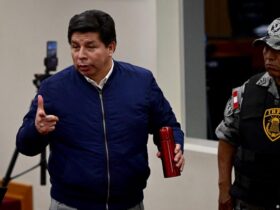Since 1999, the G20 has served as a forum bringing together the world’s leading industrialized countries and emerging economies. It is the diversity of development levels and political systems that makes the group so valuable in the eyes of its members. Consisting of 19 countries as well as the European Union and the African Union, its members are responsible for more than 80% of global economic output.
This time, three of the world’s most powerful leaders are missing – an unprecedented event in the organization’s history: US President Donald Trump, Russia’s Vladimir Putin and China’s Xi Jinping.
Xi gave no explanation for his withdrawal. Putin faces a continuing risk of detention abroad under the shadow of an arrest warrant from the International Criminal Court over the war in Ukraine and has not appeared in person since 2019.
Unlike China and Russia, the United States is not sending any delegation to South Africa.
The US President defended his decision by charging that white farmers in South Africa were being tortured and murdered while the government failed to intervene.
The South African government has categorically rejected the allegation, while Berlin has also found no evidence of genocide against white South Africans.
a new world order
What does the absence of the Big Three mean for the G20?
“This shows that the three giants of world politics clearly no longer attach much importance to this event – each for different reasons,” political scientist Johannes Warwick wrote to DW.
Warwick, professor of international relations at the University of Halle, said: “This does not bode well for the kind of multilateralism that has long been cultivated in the Group of 20.”
However, for Chancellor Friedrich Merz, this is no reason to stay away – quite the contrary.
Government spokesman Sebastian Hille said, “This is an important signal of multilateralism that the Chancellor is sending. And I would urge people not to just focus on those who are absent, but on those who are present.” “The G20 is and will remain an important format for the federal government.”
The German government described a challenging international environment for the G20, noting that the cooperative system it supports is under increasing pressure.
The tensions are most evident in Russia’s war against Ukraine. Even within the G20, some states have refused to condemn the aggression and have not only refused to join sanctions against Moscow but, like India, have benefited by acting as middlemen for Russian oil.
The geopolitical realignment since the founding of the G20 has also been marked by the dramatic economic and military rise of China. Beijing has taken advantage of its growing influence by supporting Russia in its war against Ukraine and imposing export restrictions on rare earths.
Johannes Warwick said, “We are witnessing a rapid redistribution of global political weight and power.” “The politically divided West is no longer the decisive power in many regions, while the states of the Global South are asserting themselves with new confidence.”
New priorities, new alliances
The upcoming G20 summit will be the first to be held in South Africa, and indeed on the African continent. The hosts intend to take advantage of the moment: South Africa aims to push for clean energy transitions in developing countries and debt relief in poor countries. Yet it is precisely this agenda that the US views with suspicion.
Germany takes a completely different approach.
“I will use this opportunity to engage in deeper dialogue, particularly with African states,” the Chancellor said before his departure.
After the G20 meeting, Merz will travel to Angola for the EU-African Union summit. According to the government, this sends an important signal of cooperation between Europe and Africa.
Ahead of the summit, more than 500 economists and experts urged the creation of a commission to address global wealth inequality. In an open letter to G20 delegates, he warned that “excessive concentration of wealth translates into undemocratic concentrations of power, eroding trust in our societies and polarizing our politics.”
The group led by Nobel Prize-winning economist Joseph Stiglitz is hoping for support from Chancellor Friedrich Merz. After all, Germany helped launch the ‘Global Coalition Against Inequality’ in June – an initiative that supports social justice.
Deep divisions among G20 members mean it is already clear that there will be no joint communiqué from the summit, only a statement issued by the South African hosts.
What does the future of the G20 look like under these circumstances?
Johannes Warwick wrote, “Formats such as BRICS Plus are likely to gain greater prominence. In that setting, China and Russia are left out of Western moral discourse.”
BRICS is a grouping at the center of which are Brazil, Russia, India, China and South Africa. At its 2023 summit, the group invited six additional countries to join as new members.
Multilateralism and the rules-based order that Germany supports are fast being replaced by an era of “purely interest-driven and transformative mini-lateralism”, Warwick wrote.
Despite these adverse circumstances – particularly for the German government – Warwick concluded: “For middle powers like Germany, it is wiser to rely on multilateral formats.”
This article was originally written in German.
While you’re here: Every Tuesday, DW editors provide insight into what’s happening in German politics and society. You can sign up for the weekly email newsletter, Berlin Briefing, here.






Leave a Reply